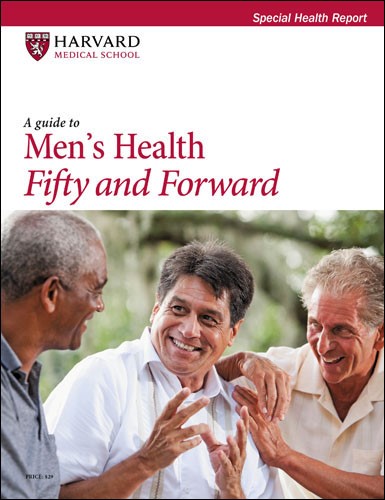Overcoming heart health obstacles
What do cardiologists tell their male patients about managing heart disease? Two Harvard experts share their experiences.
- Reviewed by Howard E. LeWine, MD, Chief Medical Editor, Harvard Health Publishing; Editorial Advisory Board Member, Harvard Health Publishing

Prevention is the best medicine, but many men wait for a problem to arise before seeking help. For heart disease — the No. 1 cause of death among men — it could be runaway blood pressure, escalating cholesterol levels, or even a heart attack.
Even when faced with the reality of heart disease, men often encounter obstacles that keep them from managing their condition or lowering their risk. What can they do?
To find out, we asked two cardiologists — Dr. Haider Warraich and Dr. Dale Adler with Harvard-affiliated Brigham and Women's Hospital — what they hear from their male patients and the advice they offer.
Think about the future. During consultations, Dr. Warraich asks his patients about how they define longevity. "When they reflect on what they hope to achieve as they age, most say they value a high quality of life and independent living rather than simply living a few years longer than normal," he says. Getting men to focus on their future helps them define goals and then determine if they are on the path to meet them. "It helps them understand their shortcomings, like needing to be serious about weight loss or managing cholesterol, and can motivate them to make lasting changes," says Dr. Warraich.
Monitor your blood pressure. Men sometimes don't feel in control of their heart health, says Dr. Warraich. One way they can play an active role is to regularly monitor their blood pressure. "The heart health risks of high blood pressure are far-reaching, and even if men are not taking medication to manage high levels, keeping tabs on their numbers can be a proactive way to look out for potential problems," says Dr. Warraich. Men can easily do this by investing in a home blood pressure monitor. Record weekly readings and alert your doctor about sudden changes.
Confront suspicions about medication. Dr. Adler has found that many men who need blood pressure medicine, statins to manage cholesterol, or other medications are hesitant to take them. "They often focus too much on potential side effects and less on the benefits," he says. Much of this may reflect a general mistrust of medicine and the idea they have to take the pills indefinitely.
But Dr. Adler says men can overcome this resistance by realizing they have a say in how the drugs are used. "I tell my patients that by making diet and lifestyle changes, they can possibly take lower doses or even eventually stop taking them," he says. "When they understand their power, they are more open to taking medication they need for better heart health."
Schedule time for health. Consistency is vital for maintaining heart-healthy exercise. But one of the top complaints Dr. Adler hears is lack of time. "In general, men are receptive to routine and schedules, but they often don't do well when it gets disrupted," he says. Dr. Adler advises his patients to find a few blocks of time that work with their schedule and daily energy levels so they have multiple options. For instance, in the morning as soon as you wake up, or in the evening before dinner (exercise before a meal also curbs appetite).
Also, treat workout sessions as critical meetings, and always have a backup plan in place. "This way, if you miss your scheduled workout, you can automatically go to plan B." For example, take a quick walk, do five minutes of squats and push-ups, or stop by the gym.
Make weight loss a group effort. One of the greatest threats to heart health is weight gain. "Weight loss is not easy, but studies have found that sharing your weight-loss efforts through friendly competitions or online community forums is a tool for staying motivated and overcoming setbacks," says Dr. Adler. You could also enlist friends and begin your own weight-loss club, where you share your daily or weekly weigh-ins, exchange tips and strategies, talk about challenges, and encourage each other.
Learn portion control. "People are generally not great at estimating food portions," says Dr. Adler. This is one reason weight-loss programs like Jenny Craig and Weight Watchers are effective, he adds. "They give you the exact portions you are supposed to eat, which is what you need to feel satisfied."
He tells his patients trying to eat healthier or lose weight to always plan their meals in advance and get in the habit of measuring portions. "This way, you can take the guesswork out of what to eat and avoid consuming extra calories."
Image: © AaronAmat/Getty Images
About the Author

Matthew Solan, Executive Editor, Harvard Men's Health Watch
About the Reviewer

Howard E. LeWine, MD, Chief Medical Editor, Harvard Health Publishing; Editorial Advisory Board Member, Harvard Health Publishing
Disclaimer:
As a service to our readers, Harvard Health Publishing provides access to our library of archived content. Please note the date of last review or update on all articles.
No content on this site, regardless of date, should ever be used as a substitute for direct medical advice from your doctor or other qualified clinician.
















